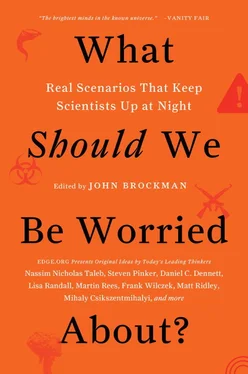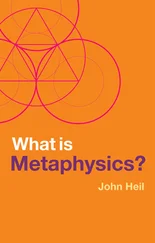These worries are in some sense just those of a narrow group of scientists, but I think they may have much wider implications. After centuries of great progress, moving toward ever deeper understanding of the universe we live in, we may be entering a new kind of era. Will intellectual progress become just a memory, with an important aspect of human civilization increasingly characterized by an unfamiliar and disturbing stasis? This unfortunately seems to be becoming something worth worrying about.
NO SURPRISES FROM THE LHC: NO WORRIES FOR THEORETICAL PHYSICS
AMANDA GEFTER
Consultant, New Scientist ; founding editor, CultureLab
It’s a physicist’s worst nightmare: After $9 billion, three decades of calculation, and the dedicated work of 10,000 scientists, CERN’s Large Hadron Collider—an underground particle accelerator spanning two nations, the largest machine humankind has ever built, the shining hope of reality hunters worldwide—hasn’t turned up a single surprise. No supersymmetric particles, extra dimensions, or unforeseen curiosities have made an appearance. Worse, the Higgs boson that did show up seems to be the very one predicted by the Standard Model. Now the machine has been switched off in preparation for a higher energy run and will remain shut down for nearly two years, leaving theoretical physicists to ponder the cosmic mysteries armed with nothing more than what they already knew.
Physicists are funny that way. Their worst nightmare is to be right. They’d much prefer to be wrong or, better yet, shocked. Being right, they fear, is a dead-end; the lack of surprises at the LHC will stifle progress in theoretical physics. But I see no reason to worry. In fact, if we look back through the history of physics, it’s clear that such progress is rarely driven by experimental anomalies.
Einstein thought deeply about the role anomalies play in physics. He distinguished between two types of theory: constructive and principled. Constructive theories, he said, are models cobbled together to account for anomalous observations, like the double-slit experiment that shaped the theory of quantum mechanics. Principled theories, on the other hand, start with logical principles from which particular facts about the world—including anomalies—can be derived. Relativity was a principled theory. “The supreme task of the physicist is to arrive at those universal elementary laws from which the cosmos can be built up by pure deduction,” Einstein said. How? By seeking out paradox—that place where established principles collide in contradiction, where logic self-destructs.
The development of the theory of special relativity offers a pristine comparison of the two approaches, since Einstein wasn’t the only one to discover its equations. Hendrik Lorentz arrived at them by way of an experimental anomaly—namely, the null results of the Michelson-Morley experiment. Albert Michelson and Edward Morley had set out to measure the Earth’s motion relative to the hypothetical ether by splitting a light beam in two and sending each half down the arm of an interferometer, one running parallel to the Earth’s motion around the sun, the other perpendicular. At the end of each arm was a mirror, which would bounce the light back to its starting point. Physicists expected that the light beamed down the parallel arm would take longer to return, since it would have to travel against the ether “wind.” To everyone’s surprise, the beams arrived at their origin at exactly the same time. To account for the anomaly, Lorentz suggested that the ether physically shortened the instrument’s parallel arm by the precise amount needed to make up for the missing time delay. How or why this miraculous contraction would occur was a mystery, but Lorentz wrote down the equations to describe the result.
Meanwhile, Einstein arrived at the same equations, only he wasn’t looking at the Michelson-Morley anomaly. He had his eye on a paradox instead. He saw that Maxwell’s theory of electromagnetism conflicted with the principle that the laws of physics be the same for all observers. Both had to be true, and both couldn’t be true. The only way to resolve a paradox is to find and then drop the offending assumption. For Einstein, the culprit was the absolute nature of space and time. In its ruin sat the principle of relativity.
If Lorentz and Einstein both came up with the equations of special relativity, why do we credit the theory to the latter? Because although Lorentz had the right equations, he had no idea what they meant. When Einstein discovered that space and time change relative to an observer’s motion so that the speed of light remains the same in every reference frame, he didn’t just account for the Michelson-Morley result, he explained it.
Paradox has driven our understanding of the universe in recent history as well—specifically, the black-hole information-loss paradox. According to quantum mechanics, information had to escape an evaporating black hole; according to relativity, it couldn’t. Both had to be true, and both couldn’t be true. This time Leonard Susskind came to the rescue. The offending assumption he fingered was the absolute nature of spacetime locality. In the remains of the paradox, Susskind discovered both the principle of horizon complementarity and the holographic principle.
It’s not hard to see that discoveries driven by paradox and principle are more useful than those arrived at through experiment. Understanding nature’s principles is just that—understanding. It’s what science is all about. Theories kludged together to account for experiment, on the other hand, are ad-hoc by their very nature. They give us the how without the why. Thus quantum mechanics, despite its incredible experimental success, remains a mystery.
That’s not to say we don’t need experiment. Experiment is the ultimate arbiter of science, tasked with the final say over whether theories are right or wrong. Anomalies are not guides but constraints. Einstein could not have derived general relativity from Mercury’s anomalous orbit. But once he discovered the theory through logical principles, its ability to account for the planet’s strange perihelion helped convince scientists that the theory was right.
Despite the disappointment echoing through the empty stretches of the LHC, physicists have plenty of anomalies on their hands already. There’s the dark energy that’s speeding up the universe’s expansion, and the unidentified dark matter that tethers stars to their galaxies. There’s the lack of large-scale fluctuations in the cosmic microwave background radiation, and the synchronized swim of galaxies dubbed the dark flow. There may even be surprises lurking in the LHC data yet.
But the point is, anomalies don’t promise understanding. For that, we need paradox. Luckily one has cropped up just in time. Put forward by Ahmed Almheiri, Donald Marolf, Joseph Polchinski, and James Sully, the “firewall paradox” once again pits general relativity against quantum mechanics in the vicinity of an evaporating black hole, but in this case horizon complementarity doesn’t seem to be enough to resolve the paradox. [a] “Black Holes: Complementarity or Firewalls?” arXiv:1207.3123v2 [hep-th] 22 Aug. 2012.
Yet another assumption will have to go. Figuring out which one to abandon will earn physicists profound insights into the workings of the universe. It’s a physicists best dream.
CRISIS AT THE FOUNDATIONS OF PHYSICS
STEVE GIDDINGS
Theoretical physicist, UC Santa Barbara
What really keeps me awake at night (besides being sued by an unprincipled water developer in Utah—another story) is that we face a crisis within the deepest foundations of physics. The only way out seems to involve profound revision of fundamental physical principles.
Читать дальше












